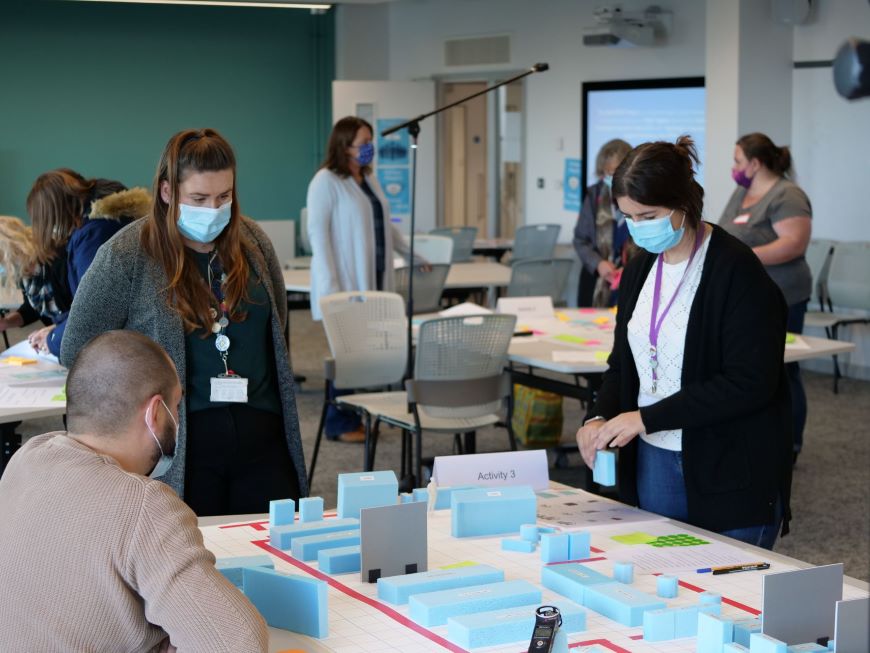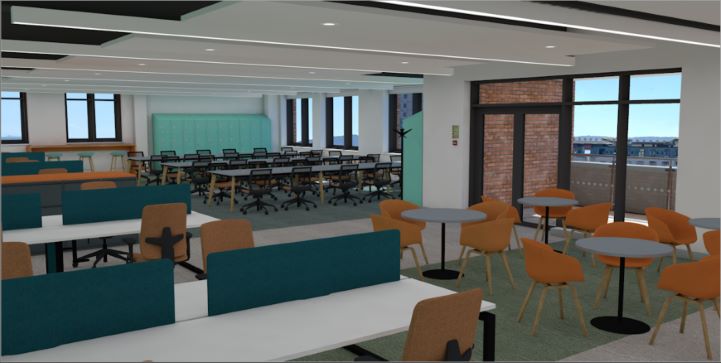A new six-month study to evaluate the impact of workplace environments on health, wellbeing, and performance within a post-Covid-19 environment is under way at the University of Wales Trinity Saint David (UWTSD).

The £33k Well Spaces and Academic Environments (WellSPACE) project, which will utilise usability and longitudinal behavioural analysis, is collaboration between UWTSD’s Assistive Technologies Innovation Centre (ATiC), the Psychological Evaluation and Research Consultancy Hub (PERCH) within the Centre for Psychology and Counselling, and renowned architectural practice Stride Treglown.
It is supported by Life Sciences Hub Wales through Accelerate, a £24million co-funded programme by the European Regional Development Fund (ERDF) through the Welsh Government.
The project will be based on a case study approach around a newly modified academic workspace at the UWTSD’s SA1 Waterfront academic quarter, using this as a test bed for developing new approaches to architectural space design for ‘knowledge-based working’.
Dr Ceri Phelps, Health Psychologist and Academic Director of Psychology and Counselling at UWTSD, said:
“The Covid-19 pandemic enforced a dramatic change to the working practices of millions of people across the UK and beyond, with national lockdowns and the sudden and unplanned move to online working from home having a significant impact on many existing working practices, quality of life, and wellbeing.
For those in employment during the pandemic, the significant changes to working practices and work-life balance associated with working from home has led to increasing concerns about the ongoing impact of the pandemic on the wellbeing of the nation’s workforce and the need to identify effective future working practices.
For others, employees will be expected to return to traditional working environments that will inevitably function differently from those existing pre-Covid-19.
It is clear that there is a timely opportunity to explore how best to structure the future work environment to ensure maximum productivity, organisational commitment, and workforce health and wellbeing post-Covid-19.”
The WellSPACE project creates an opportunity to systematically explore what the future of working spaces and practices should look like, by testing these within a higher education context, and will develop new and innovative architectural and spatial programming design strategies that can be translated to working environments in other knowledge and professional service sectors.
ATiC will work with Stride Treglown to discover and define the user experiences and perceived needs of university staff in response to virtual simulations of existing and new/proposed office working environments. And PERCH will work with Stride Treglown to assess the actual impact of the working environment’s design upon university staff over an academic semester.
The project will test health and wellbeing responses to virtual environments and explore the limits of how such techniques can be used to measure and support health outcomes in real environments.

Dr Sean Jenkins, Associate Professor and ATiC Principal Innovation Fellow, said:
“The overarching project aim is to pilot a mixed method approach to evaluate the impact of workplace environments on health, wellbeing, and performance.
This project aims to employ a co-creation approach with academic staff using a novel combination of lo-fidelity 3D scale models through to hi-fidelity virtual reality (VR) simulations to understand and explore user responses to current and proposed spatial designs. This will be allied with ecological momentary assessment to test psychometric responses to the real workspace over a period of months.
Uniquely, the project will bring together the spatial programming and design expertise of Stride Treglown, with ATIC’s VR and usability testing expertise, and the psychological research expertise of PERCH. This exciting collaboration will explore the opportunities for developing new user centred research methods and approaches to inform healthier architectural design and space programming strategies in the future.”
Pierre Wassenaar, Director of Stride Treglown, said:
“Obtaining accurate, dependable, responses to how people perceive designed environments is something of a holy grail, and it’s tremendous to be working with this talented team at UWTSD to take this research into new areas.”
For further information please contact Bethan Evans, ATiC Project Officer, Marketing and Communications, bethan.evans@uwtsd.ac.uk.



